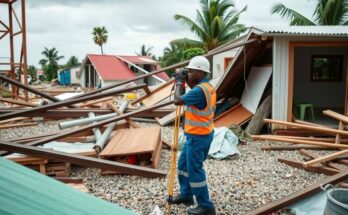The President of the World Bank, Ajay Banga, indicated that the bank’s climate policies will remain stable regardless of the U.S. presidential election outcome. The World Bank aims to increase its climate financing from 35 to 45 percent of total lending by mid-2025, emphasizing climate adaptation efforts as crucial for sustainable development. Banga dismissed the idea of an administration undermining these climate targets and underscored the global economic interdependence regarding renewable energy and infrastructure development.
The President of the World Bank, Ajay Banga, expressed confidence in the sustainability of the institution’s climate policies, asserting that they would remain unaffected by the outcome of the upcoming U.S. presidential election. In a recent interview with AFP, Banga emphasized the World Bank’s commitment to enhancing its climate financing from 35 percent to 45 percent of its total lending by the end of its financial year in June 2025. His remarks come as the World Bank approaches this goal ahead of the Annual Meetings of the International Monetary Fund and the World Bank in Washington. Banga highlighted specific aspects of climate adaptation, such as the construction of climate-resilient infrastructure, as vital components of “development done smart.” In the context of the electoral landscape, he addressed concerns regarding the potential implications of a Trump presidency, noting that it is improbable for future administrations to reverse the World Bank’s established climate targets. He illustrated this point by stating, “I do not see any administration saying you should not paint a school roof white to reduce the temperature inside, or you should not build a hospital or a school that can withstand a heavy climate event.” Moreover, Banga discussed the significance of renewable energy and grid connectivity, particularly for African nations, suggesting that enhanced electricity access could contribute positively to economic growth globally. He remarked, “If Africa gets 300 million people connected to electricity… whose products will they buy? Which technology will they use?” stressing the interdependence of global economies in addressing climate and energy challenges.
Climate change has become an increasingly urgent priority for international development organizations like the World Bank. The bank’s commitment to integrating climate concerns into its funding strategies is evidence of a broader recognition of the critical role of climate adaptation and mitigation in fostering sustainable development. The shift towards enhancing climate financing reflects the global community’s growing understanding of the economic and social implications of climate change, influencing policy choices at the national and international levels.
In summary, the World Bank’s climate initiatives, under the leadership of President Ajay Banga, are poised to advance irrespective of the political climate in the United States. With a definitive goal to increase climate financing contributions, the World Bank underscores the importance of sustainable development practices and recognizes the interconnectedness of global economies in combatting climate change. The focus on smart development through climate resilience aligns with global development objectives, presenting a united front in addressing the challenges posed by climate change.
Original Source: www.barrons.com




